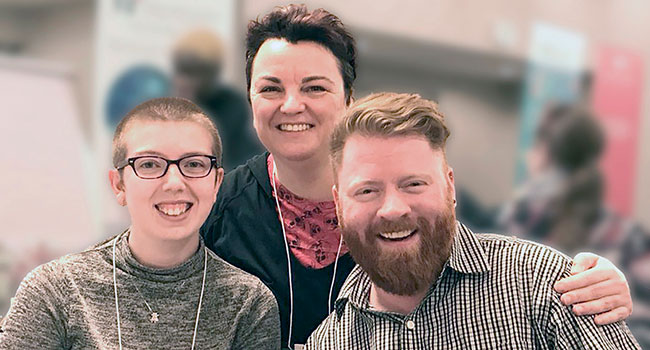
U of A educator Amanda Bolderston (centre), Evan Taylor from the University of Fraser Valley (right), and Meghan McInnis from Queen’s University launched the Queering Cancer website to help close an information gap in resources and services tailored to LGBTQ2+ people. (Photo: Supplied)
Cancer doesn’t discriminate, but the health-care system sometimes does. There’s a marked gap in information when it comes to resources and peer-support services tailored to LGBTQ2+ people. That need in the system is what prompted a University of Alberta faculty educator and collaborators to launch a new website, called Queering Cancer, aimed at closing the gap.
The website includes a peer support forum, a collection of patient stories and a fully searchable database of cancer resources specific to LGBTQ2+ individuals.
Amanda Bolderston, an educator in the U of A’s radiation therapy program, worked with collaborators Meghan McInnis at Queen’s University and Evan Taylor at the University of Fraser Valley to tailor the resources with the queer community, including patient partner Mary Morgan, who came up with the name for the website. Every element of the site was curated with the audience in mind, and the team worked to ensure details were sensitive to their audience’s experiences.
According to Bolderston, health-care language can be quite gendered, and often changes are needed to tailor language for an LGBTQ2+ audience. The inclusion of a community forum where visitors could interact was also crucial for the site.
“There are very few face-to-face cancer support groups out there, and the ones that do exist don’t tend to last very long because the patient numbers are small and participants are sometimes worried about being identified or outed. So an online space made sense,” said Bolderston.
“When we did the CIHR Design Jam [where the website was initially conceived], we met a trans man with a gynecological cancer. He was from a rural community, and when he went to his doctor to ask for support, his doctor referred him to a cervical cancer support group that was all women. He never went. He said, ‘That’s not somewhere I’d feel comfortable going.’ So, for him, [with the community forum] he can log in and talk to someone in B.C. or Australia and find someone who has the same diagnosis and the same identity, and maybe find some common support.”
In addition to a repository of more than 200 resources curated for LGBTQ2+ people with cancer and their loved ones, website visitors can find patient stories that give them insight into other individuals’ experiences.
The trio of creators estimate they have put in thousands of volunteer hours to develop the website. Queering Cancer officially launched on Oct. 27, and according to Bolderston, the response has been overwhelmingly positive.
The initiative was made possible by funding from the Canadian Institutes of Health Research, Gender and Health Institute. The next step for the group involves looking for sustainment funding to help with additional outreach efforts supporting more initiatives targeting the LGBTQ2+ cancer community.
| By Adrianna MacPherson
The views, opinions and positions expressed by columnists and contributors are the author’s alone. They do not inherently or expressly reflect the views, opinions and/or positions of our publication.

